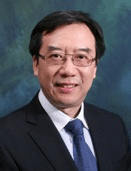Message from the Head

Welcome to the Department of Land Surveying and Geo-Informatics. Last year, the Department celebrated its 30th anniversary. Over the past 10 years it has experienced extensive rapid development to the point by which, and also in accordance with the SCI citation per staff, it is now ranked, as the leading Geomatics department in the academic world.
The geomatics discipline of the Department covers not only traditional land surveying, but also, and even more importantly, the latest spatial information sciences and technologies. The latter includes such as geographic information science and systems, satellite remote sensing and global navigation satellite systems. These highly sophisticated technologies have been widely used not only for advanced scientific programs such as, Beidou and the lunar exploration missions, but also for daily living, such as individual public transport mode selection and in- car navigation. Our colleagues have been involved in both upstream scientific research and downstream applied technological development.
The key factors influencing the department's quality teaching and high research achievements are the drive, innovatory skills and enthusiasm of our staff. Currently, we have approximately 70 staff members in the Department. Included are 23 academic staff, some of whom are leading scholars, and respected internationally, in their fields. Additionally there are 12 well experienced supporting staff, and 45 dedicated research personnel. The PhD or post-doc qualifications, together with further academic staff experience were acquired in many countries including Australian, Canada, Germany, China Hong Kong, UK and the USA.
Urban geo-informatics for the further exploration of smart city concepts has been identified as the strategic development direction of the Department. Within this framework, focus is on a wide range of research, including urban geo-informatics, smart city, spatial big data analytics, mobile mapping, urban disaster mitigation, positioning and navigation, utility surveys and management, planetary mapping, urban 3D modelling and remote sensing for environmental studies. The Department has received awards for over 100 projects during the past three years, including two ITF projects for over HK$ 20 million. Apart from basic research, there has also been active engagement in applied research and technology transfer. Further contribution is made by the holding of important roles in various professional organizations and government advisory committees.
In addition to highly respected research achievements, the Department is dedicated to offering a full range of geomatics programmes. Included in this respect are such as High Diplomas, Bachelor of Science, Master of Science, and up to PhD. The Department has a total of over 500 registered local and international students. The above programmes are accredited by both local and regional professional institutions, including HKIS, RICS, HKIE and HKIES. Hence our students are entitled to become chartered land surveyors or engineers subject to normal further institutional examinations, after their graduation from the University. Our Department has also been actively involved in service learning education, hence PolyU students, even before entering the world of work have the benefit of experience which enables them "to learn and to apply, for the benefit of mankind"
To assist and support the above research and teaching activities, the Department has nine well equipped laboratories including a Cadastre Survey Laboratory, Digital Cartography Laboratory, Geomatics Computing Laboratory, Geographic Information Systems Laboratory, Hydrographic Survey Laboratory, Navigation Laboratory, Photogrammetry and Remote Sensing Laboratory, Survey Store and Instrumentation Laboratory and Underground Utility Survey Laboratory.
The specific aim of the involvement is to serve the academic community and society. Through our research and teaching efforts, the Department has had a very high impact on both the local and international geomatics academic and professional communities.
With your support, we look forward to even greater progress for our Department.